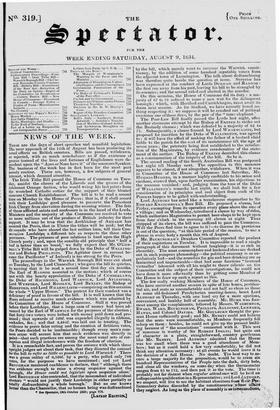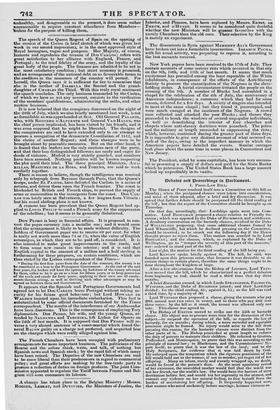NEWS OF THE WEEK.
THESE are the days of short speeches and manifold legislation. The near approach of the 12th of August has been producing its usual effects on British senators. Bills are passed, withdrawn, or rejected, with as much nonchalance as if the existence of grouse instead of the lives and fortunes of Englishmen were dependent upon the "Ayes or Noes have it" of the sonorous Speaker. The business of the week has in fact been for the most part merely routine. There are, however, a few subjects of general interest, which demand attention.
The Irish Tithe Bill passed the House of Commons on Tuesday, amidst the cheers of the Liberals and the groans of the intolerant Orange faction,who would wring his last potato from the wretched Catholic cottier for the support of their bloated sinecure Church Establishment. The bill is to be read a second time on Monday in the House of Peers; that is, if it shall accord with their Lordships good pleasure to preserve the Protestant Irish Clergy from starvation during the ensuing winter. The fate of these afflicted saints and confessors is in the hand of the Lords. Ministers and the majority of the Commons are resolved to vote no more millions out of the produce of British industry for their support. It may be true that the Archbishop of ARMAGH has assured the Peers, that in Ulster the tithes will be paid; but the tlrasands who have shared the last million loan, tell their Conservative Lordships a different tale as respects the three other provinces. The pressure of poor relations is hard upon the High Church party ; and, upon the sensible old principle that" half a loaf is better than no bread," we fully expect that Mr. Otos/WELL'S Tithe Bill will be gulped down by the Duke of WELLINGam and Bishop PHILLPOTS. The Agitator (now in earnest become the Pacificator* of Ireland) is too strong for the Peers.
The proceedings in the Warwick Borough Bill were cut short on Tuesday, by the Lord Chancellor ; who gave the bill its quietus, by moving that it be read a second time that day six months. The Earl of RADNOR assented to the motion; which of course met with the hearty approbation of the Duke of CUMBERLAND, the Duke of RICHMOND, Lord WARWICK, Lord AYLESFORD, Lord WYNFORD, Lord ROSSLYN, Lord BEXLEY, the Bishop of HEREFORD, and Lord W HARNCLIFFE—00111 prising 011 this occasion the whole " Upper House." The pretext for their conduct was a deficiency of proof in favour of the bill. It is well known that the Peers refused to receive much evidence which was admitted by the Committee of the House of Commons. Still it was proved before their Lordships, that a large sum of money had been advanced by the Earl of WARWICK for the purposes of the election ; that forty-two voters were bribed with money paid down and promised; that upwards of 500/. was expended illegally in ribbons, cockades, &c.; and that 4,464/. was laid out in treating. The evidence to prove false rating and the creation of fictitious votes, the Peers decided to be inadmissible ; though every man's common sense will assure him that such evidence was directly in Point—that such practices are among the most usual acts of corruption and illegal interference with the freedom of election. It is a remarkable fact, and proves the animus with which these tiPright judges set about their task, that they directed the counsel for the bill to refer as little as possible to Lord Warwick ! There was a gross outlay of 8,500/. by a party, who polled only 700 votes, for the purposes we have mentioned ; and yet Lord BaouorrAm mustered confidence to declare, that" although there was evidence enough to raise a strong suspicion against the borough, the House could not legislate upon suspicion alone." Lord BROUGHAM also contended, that the misconduct of individual electors " would not justify their Lordships in either partially or totally disfranchising a whole borough." But no one knows better than the Chancellor, that no human being was disfranchised
• See Spectator, 19th October 1833; pap 976.
[LATER Eanlom] by the bill, which merely went to increase the Warwick constituency, by the addition of some hundred reputable voters from the adjacent town of Leamington. The talk about disfranchising was therefore quite beside the question at issue. Surprise has been expressed at the conduct of Lords DURHAM and RADNOR : the first ran away from his post, leaving his bill to be strangled by its enemies; and the second aided and abetted in the murder.
On this occasion, the House of Commons did its duty : a majority of 67 to 18 refused to issue a new writ for the delinquent borough ; which, with Hertford and Carrickfergus, must await its doom next session. As for Stafford, we have recently heard no758 thing respecting it : we suppose it will be crushed out of political existence one of these days, by the paw of the " tame. elephant." The Poor-Law Bill finally passed the Lords last night, after another strenuous attempt by the Bishop of EXETER to strike out the Bastardy clauses ; which was defeated by a majority of 82 to 71. Subsequently, a clause framed by Lord "tirnARNCLIFFE, but proposed for insertion by the Duke of WELLINGTON, was agreed to: it will have the effect of making the father of. a bastard child liable to the parish for the cost of its maintenance till the age of seven years ; the paternity being first established to the satisfaction of the Magistrates, by evidence corroborative of the statement of the mother. The Bishop of EXETER described this clause as a consummation of the iniquity of the bill. Se be it. The second reading of the South Australian Bill was postponed last night till Monday next. The opposition to this measure appears to be almost, if not altogether, withdrawn. When it was in Committee of the House of Commons last Saturday, Mr. HUGHES HUGHES, ill a manner highly creditable to his sense and candour, avowed that, upon further examination, his objections to the measure vanished : and, judging from the tone of the Duke of WELLINGTON'S remarks last night, we shall look for a fair consideration of its principles and real object from such of the Peers as happen to be gifted with understanding. Lord ALTHORP has acted like a treacherous stepmother to Sir EDWARD KNATCHBULL'S Beer Bill. He proposed a clause, last Friday, exempting from its operation every place above the size of a village; and on Wednesday, introduced a clause by way of rider, which authorizes Magistrates to permit beer-shops to be kept open from four o'clock in the morning till eleven at night Thus stripped of its claws, the bill was suffered to pass the Commons. Will the Peers find time to agree to it ?—to discuss its provisions is out of the question, "at this late period of the session," to use a phrase in every body's mouth this 9th of August. Mr. BUCKINGHAM'S Drunken Committee reported the product of their cogitations on Tuesday. It is impossible to read a single paragraph of this document without laughing—it is so rich in absurdity. The most commonplace and hacknied ideas are decked out in such pompous phraseology—the political economy is so superlatively bad—and the remedies for gin and beer-drinking are so fantastical and impracticable—that had some facetious "licensed victualler" laboured with all his might to throw ridicule on the Committee and the subject of their investigations, he could not have done it more effectually than by getting some Member of the House to draw up such a report as this. The few really working Members of the House of Commons, who have survived another session in spite of late hours, pestilential air, and seats as uncomfortable and not half so clean as those in some old-fashioned Presbyterian meeting-house, beset Lord ALTHORP on Thursday, with one loud cry for a more spacious, convenient, and healthy ball of assembly. Mr. HUME was foreMost among the complainants, followed by Messrs. WARBURTON, EWART, WARD, BUCKINGHAM, PHILLIPS, AGLIONBY,LENNARD, HAWES, and Colonel DAVIES. Mr. GOULBURN thought the present House sufficiently good ; and Mr. BENETT could not believe that the seats were uncomfortable, as Members frequently fell asleep on them : besides, he could not give up the present building because of " the associations" connected with it. This sort of nonsense is worthy of Sir ROBERT INGLIS; but quite out of character in a plain, straightforward, country gentleman like Mr. BENErr. Lord ALTHORP admitted that the House was too small when there was a good attendance of Members; but as it could hold a few very comfortably, he did not think any alteration necessary: at all events he would leave it to the decision of a full House. No doubt. The best way to secure a large majority for the proposition, would be to cram six hundred Representatives of the People into the dark, dirty hole, and close all the windows, on some day when the thermometer ranges from 85 to 112, and then put it to the vote. The time is probably not far distant when regular attend,mce will be held an indispensable qualification in a Representative; and Lord 4 Lyn oR r, we suspect, will live to see the habitual absentees frotalteit coar7 liamentary duties discarded by the constituencies whose AWN they neglect. As long as the place of assembly is se ineommAious,
tinhealthy, and disagreeable as the present, it does seem rather unreasonable to require constant attendance from Members— Aimless for the purpose of kiUing them.





















 Previous page
Previous page